International Business Internship: Leadership Skills Reflection Report
VerifiedAdded on 2022/10/01
|7
|1502
|223
Report
AI Summary
This report presents a student's reflective analysis of their internship experience at Vijay India Restaurant, focusing on the development and application of leadership skills. The student, acting as a supervisor, was responsible for overseeing front and back-of-house operations, ensuring customer satisfaction, managing staff, and maintaining hygiene standards. The report identifies key leadership tasks, such as team management and conflict resolution, and evaluates the effectiveness of these skills through a judgment checklist. A literature review supports the practical experience, highlighting essential leadership elements like problem-solving, motivation, and critical thinking. The student concludes by assessing their strengths and weaknesses, emphasizing the practical application of leadership skills in a real-world setting and their readiness for future endeavors. The report also provides a detailed account of the challenges faced and strategies implemented to overcome them, alongside references supporting the theoretical framework.
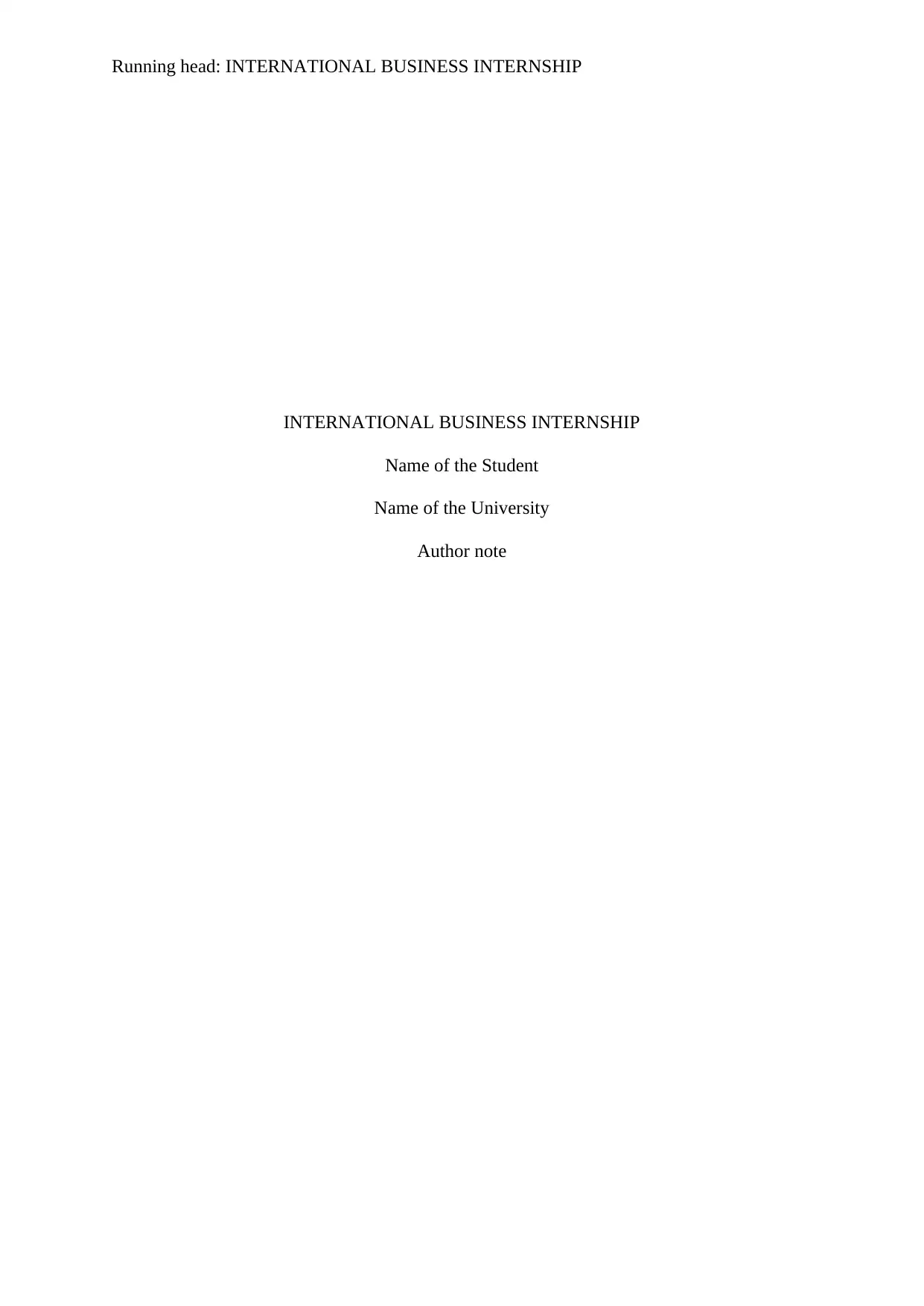
Running head: INTERNATIONAL BUSINESS INTERNSHIP
INTERNATIONAL BUSINESS INTERNSHIP
Name of the Student
Name of the University
Author note
INTERNATIONAL BUSINESS INTERNSHIP
Name of the Student
Name of the University
Author note
Paraphrase This Document
Need a fresh take? Get an instant paraphrase of this document with our AI Paraphraser
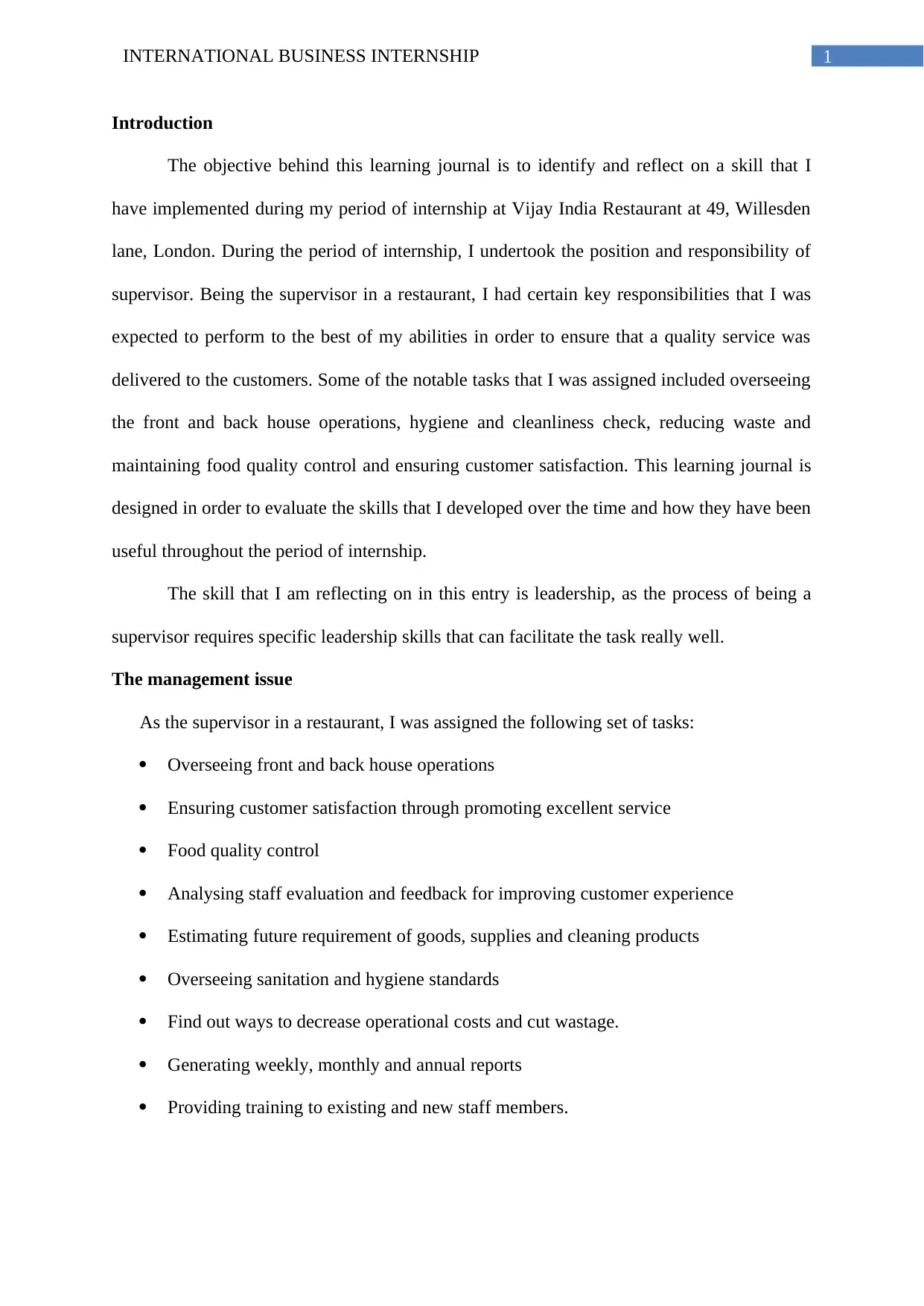
1INTERNATIONAL BUSINESS INTERNSHIP
Introduction
The objective behind this learning journal is to identify and reflect on a skill that I
have implemented during my period of internship at Vijay India Restaurant at 49, Willesden
lane, London. During the period of internship, I undertook the position and responsibility of
supervisor. Being the supervisor in a restaurant, I had certain key responsibilities that I was
expected to perform to the best of my abilities in order to ensure that a quality service was
delivered to the customers. Some of the notable tasks that I was assigned included overseeing
the front and back house operations, hygiene and cleanliness check, reducing waste and
maintaining food quality control and ensuring customer satisfaction. This learning journal is
designed in order to evaluate the skills that I developed over the time and how they have been
useful throughout the period of internship.
The skill that I am reflecting on in this entry is leadership, as the process of being a
supervisor requires specific leadership skills that can facilitate the task really well.
The management issue
As the supervisor in a restaurant, I was assigned the following set of tasks:
Overseeing front and back house operations
Ensuring customer satisfaction through promoting excellent service
Food quality control
Analysing staff evaluation and feedback for improving customer experience
Estimating future requirement of goods, supplies and cleaning products
Overseeing sanitation and hygiene standards
Find out ways to decrease operational costs and cut wastage.
Generating weekly, monthly and annual reports
Providing training to existing and new staff members.
Introduction
The objective behind this learning journal is to identify and reflect on a skill that I
have implemented during my period of internship at Vijay India Restaurant at 49, Willesden
lane, London. During the period of internship, I undertook the position and responsibility of
supervisor. Being the supervisor in a restaurant, I had certain key responsibilities that I was
expected to perform to the best of my abilities in order to ensure that a quality service was
delivered to the customers. Some of the notable tasks that I was assigned included overseeing
the front and back house operations, hygiene and cleanliness check, reducing waste and
maintaining food quality control and ensuring customer satisfaction. This learning journal is
designed in order to evaluate the skills that I developed over the time and how they have been
useful throughout the period of internship.
The skill that I am reflecting on in this entry is leadership, as the process of being a
supervisor requires specific leadership skills that can facilitate the task really well.
The management issue
As the supervisor in a restaurant, I was assigned the following set of tasks:
Overseeing front and back house operations
Ensuring customer satisfaction through promoting excellent service
Food quality control
Analysing staff evaluation and feedback for improving customer experience
Estimating future requirement of goods, supplies and cleaning products
Overseeing sanitation and hygiene standards
Find out ways to decrease operational costs and cut wastage.
Generating weekly, monthly and annual reports
Providing training to existing and new staff members.
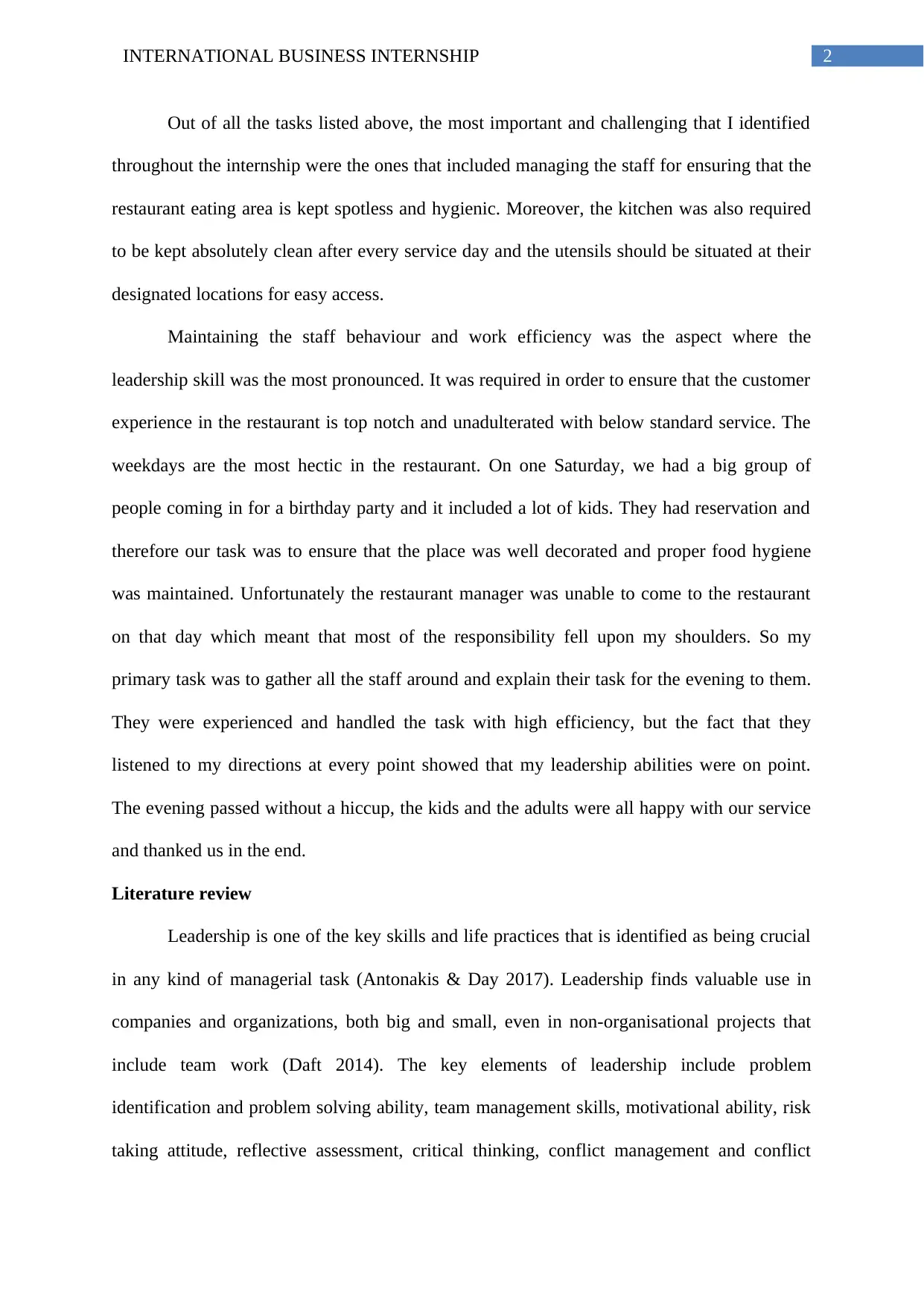
2INTERNATIONAL BUSINESS INTERNSHIP
Out of all the tasks listed above, the most important and challenging that I identified
throughout the internship were the ones that included managing the staff for ensuring that the
restaurant eating area is kept spotless and hygienic. Moreover, the kitchen was also required
to be kept absolutely clean after every service day and the utensils should be situated at their
designated locations for easy access.
Maintaining the staff behaviour and work efficiency was the aspect where the
leadership skill was the most pronounced. It was required in order to ensure that the customer
experience in the restaurant is top notch and unadulterated with below standard service. The
weekdays are the most hectic in the restaurant. On one Saturday, we had a big group of
people coming in for a birthday party and it included a lot of kids. They had reservation and
therefore our task was to ensure that the place was well decorated and proper food hygiene
was maintained. Unfortunately the restaurant manager was unable to come to the restaurant
on that day which meant that most of the responsibility fell upon my shoulders. So my
primary task was to gather all the staff around and explain their task for the evening to them.
They were experienced and handled the task with high efficiency, but the fact that they
listened to my directions at every point showed that my leadership abilities were on point.
The evening passed without a hiccup, the kids and the adults were all happy with our service
and thanked us in the end.
Literature review
Leadership is one of the key skills and life practices that is identified as being crucial
in any kind of managerial task (Antonakis & Day 2017). Leadership finds valuable use in
companies and organizations, both big and small, even in non-organisational projects that
include team work (Daft 2014). The key elements of leadership include problem
identification and problem solving ability, team management skills, motivational ability, risk
taking attitude, reflective assessment, critical thinking, conflict management and conflict
Out of all the tasks listed above, the most important and challenging that I identified
throughout the internship were the ones that included managing the staff for ensuring that the
restaurant eating area is kept spotless and hygienic. Moreover, the kitchen was also required
to be kept absolutely clean after every service day and the utensils should be situated at their
designated locations for easy access.
Maintaining the staff behaviour and work efficiency was the aspect where the
leadership skill was the most pronounced. It was required in order to ensure that the customer
experience in the restaurant is top notch and unadulterated with below standard service. The
weekdays are the most hectic in the restaurant. On one Saturday, we had a big group of
people coming in for a birthday party and it included a lot of kids. They had reservation and
therefore our task was to ensure that the place was well decorated and proper food hygiene
was maintained. Unfortunately the restaurant manager was unable to come to the restaurant
on that day which meant that most of the responsibility fell upon my shoulders. So my
primary task was to gather all the staff around and explain their task for the evening to them.
They were experienced and handled the task with high efficiency, but the fact that they
listened to my directions at every point showed that my leadership abilities were on point.
The evening passed without a hiccup, the kids and the adults were all happy with our service
and thanked us in the end.
Literature review
Leadership is one of the key skills and life practices that is identified as being crucial
in any kind of managerial task (Antonakis & Day 2017). Leadership finds valuable use in
companies and organizations, both big and small, even in non-organisational projects that
include team work (Daft 2014). The key elements of leadership include problem
identification and problem solving ability, team management skills, motivational ability, risk
taking attitude, reflective assessment, critical thinking, conflict management and conflict
⊘ This is a preview!⊘
Do you want full access?
Subscribe today to unlock all pages.

Trusted by 1+ million students worldwide
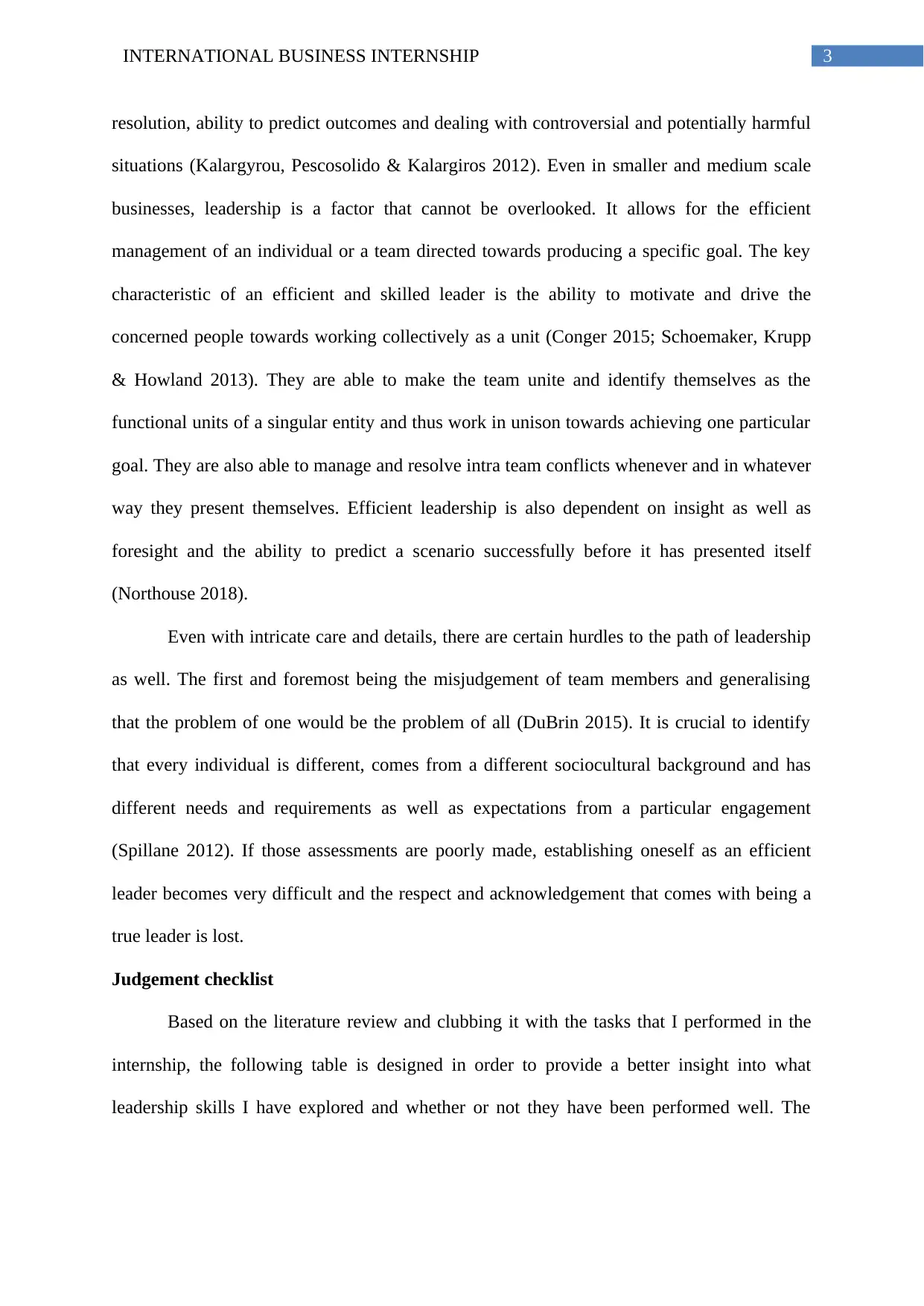
3INTERNATIONAL BUSINESS INTERNSHIP
resolution, ability to predict outcomes and dealing with controversial and potentially harmful
situations (Kalargyrou, Pescosolido & Kalargiros 2012). Even in smaller and medium scale
businesses, leadership is a factor that cannot be overlooked. It allows for the efficient
management of an individual or a team directed towards producing a specific goal. The key
characteristic of an efficient and skilled leader is the ability to motivate and drive the
concerned people towards working collectively as a unit (Conger 2015; Schoemaker, Krupp
& Howland 2013). They are able to make the team unite and identify themselves as the
functional units of a singular entity and thus work in unison towards achieving one particular
goal. They are also able to manage and resolve intra team conflicts whenever and in whatever
way they present themselves. Efficient leadership is also dependent on insight as well as
foresight and the ability to predict a scenario successfully before it has presented itself
(Northouse 2018).
Even with intricate care and details, there are certain hurdles to the path of leadership
as well. The first and foremost being the misjudgement of team members and generalising
that the problem of one would be the problem of all (DuBrin 2015). It is crucial to identify
that every individual is different, comes from a different sociocultural background and has
different needs and requirements as well as expectations from a particular engagement
(Spillane 2012). If those assessments are poorly made, establishing oneself as an efficient
leader becomes very difficult and the respect and acknowledgement that comes with being a
true leader is lost.
Judgement checklist
Based on the literature review and clubbing it with the tasks that I performed in the
internship, the following table is designed in order to provide a better insight into what
leadership skills I have explored and whether or not they have been performed well. The
resolution, ability to predict outcomes and dealing with controversial and potentially harmful
situations (Kalargyrou, Pescosolido & Kalargiros 2012). Even in smaller and medium scale
businesses, leadership is a factor that cannot be overlooked. It allows for the efficient
management of an individual or a team directed towards producing a specific goal. The key
characteristic of an efficient and skilled leader is the ability to motivate and drive the
concerned people towards working collectively as a unit (Conger 2015; Schoemaker, Krupp
& Howland 2013). They are able to make the team unite and identify themselves as the
functional units of a singular entity and thus work in unison towards achieving one particular
goal. They are also able to manage and resolve intra team conflicts whenever and in whatever
way they present themselves. Efficient leadership is also dependent on insight as well as
foresight and the ability to predict a scenario successfully before it has presented itself
(Northouse 2018).
Even with intricate care and details, there are certain hurdles to the path of leadership
as well. The first and foremost being the misjudgement of team members and generalising
that the problem of one would be the problem of all (DuBrin 2015). It is crucial to identify
that every individual is different, comes from a different sociocultural background and has
different needs and requirements as well as expectations from a particular engagement
(Spillane 2012). If those assessments are poorly made, establishing oneself as an efficient
leader becomes very difficult and the respect and acknowledgement that comes with being a
true leader is lost.
Judgement checklist
Based on the literature review and clubbing it with the tasks that I performed in the
internship, the following table is designed in order to provide a better insight into what
leadership skills I have explored and whether or not they have been performed well. The
Paraphrase This Document
Need a fresh take? Get an instant paraphrase of this document with our AI Paraphraser
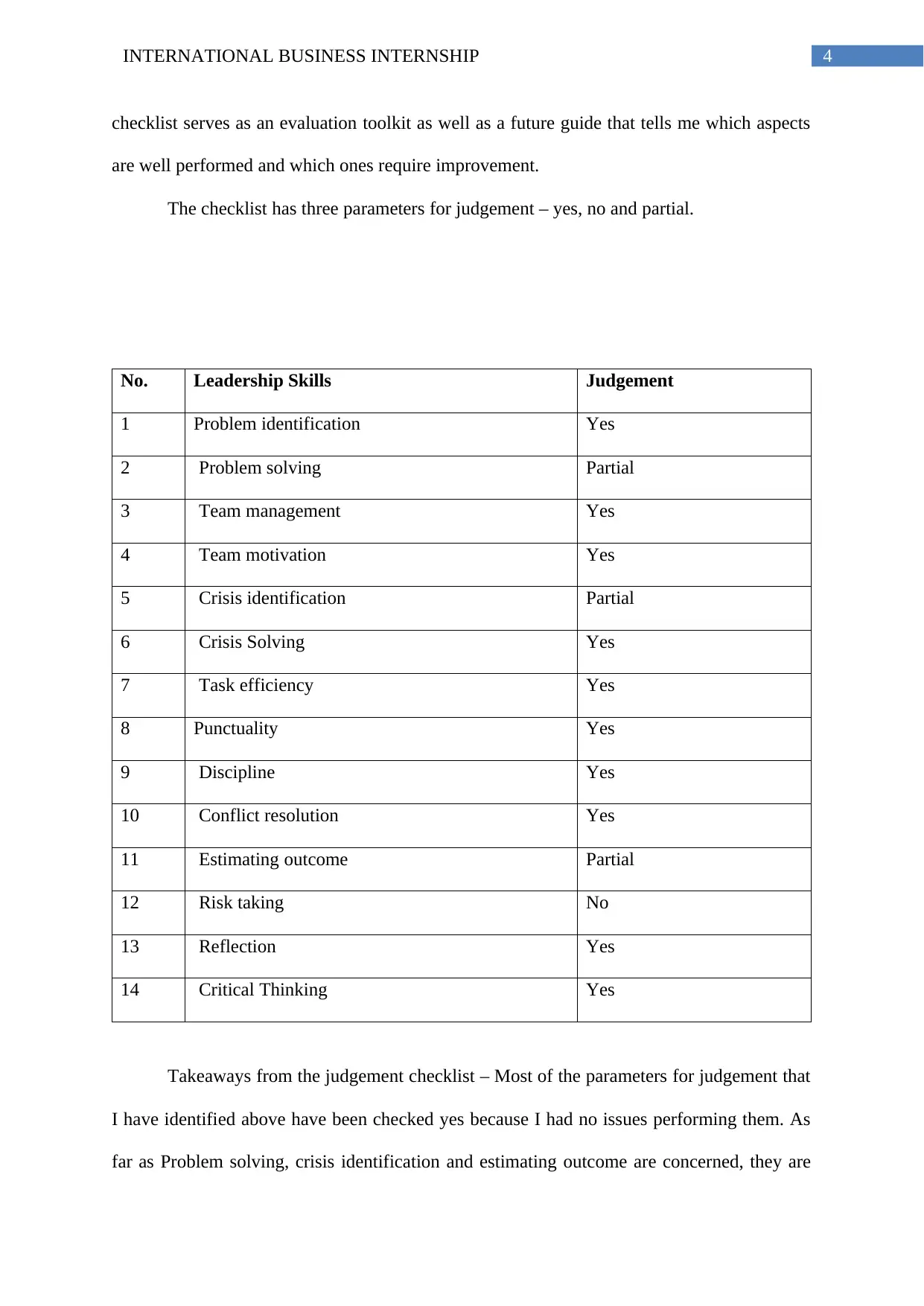
4INTERNATIONAL BUSINESS INTERNSHIP
checklist serves as an evaluation toolkit as well as a future guide that tells me which aspects
are well performed and which ones require improvement.
The checklist has three parameters for judgement – yes, no and partial.
No. Leadership Skills Judgement
1 Problem identification Yes
2 Problem solving Partial
3 Team management Yes
4 Team motivation Yes
5 Crisis identification Partial
6 Crisis Solving Yes
7 Task efficiency Yes
8 Punctuality Yes
9 Discipline Yes
10 Conflict resolution Yes
11 Estimating outcome Partial
12 Risk taking No
13 Reflection Yes
14 Critical Thinking Yes
Takeaways from the judgement checklist – Most of the parameters for judgement that
I have identified above have been checked yes because I had no issues performing them. As
far as Problem solving, crisis identification and estimating outcome are concerned, they are
checklist serves as an evaluation toolkit as well as a future guide that tells me which aspects
are well performed and which ones require improvement.
The checklist has three parameters for judgement – yes, no and partial.
No. Leadership Skills Judgement
1 Problem identification Yes
2 Problem solving Partial
3 Team management Yes
4 Team motivation Yes
5 Crisis identification Partial
6 Crisis Solving Yes
7 Task efficiency Yes
8 Punctuality Yes
9 Discipline Yes
10 Conflict resolution Yes
11 Estimating outcome Partial
12 Risk taking No
13 Reflection Yes
14 Critical Thinking Yes
Takeaways from the judgement checklist – Most of the parameters for judgement that
I have identified above have been checked yes because I had no issues performing them. As
far as Problem solving, crisis identification and estimating outcome are concerned, they are
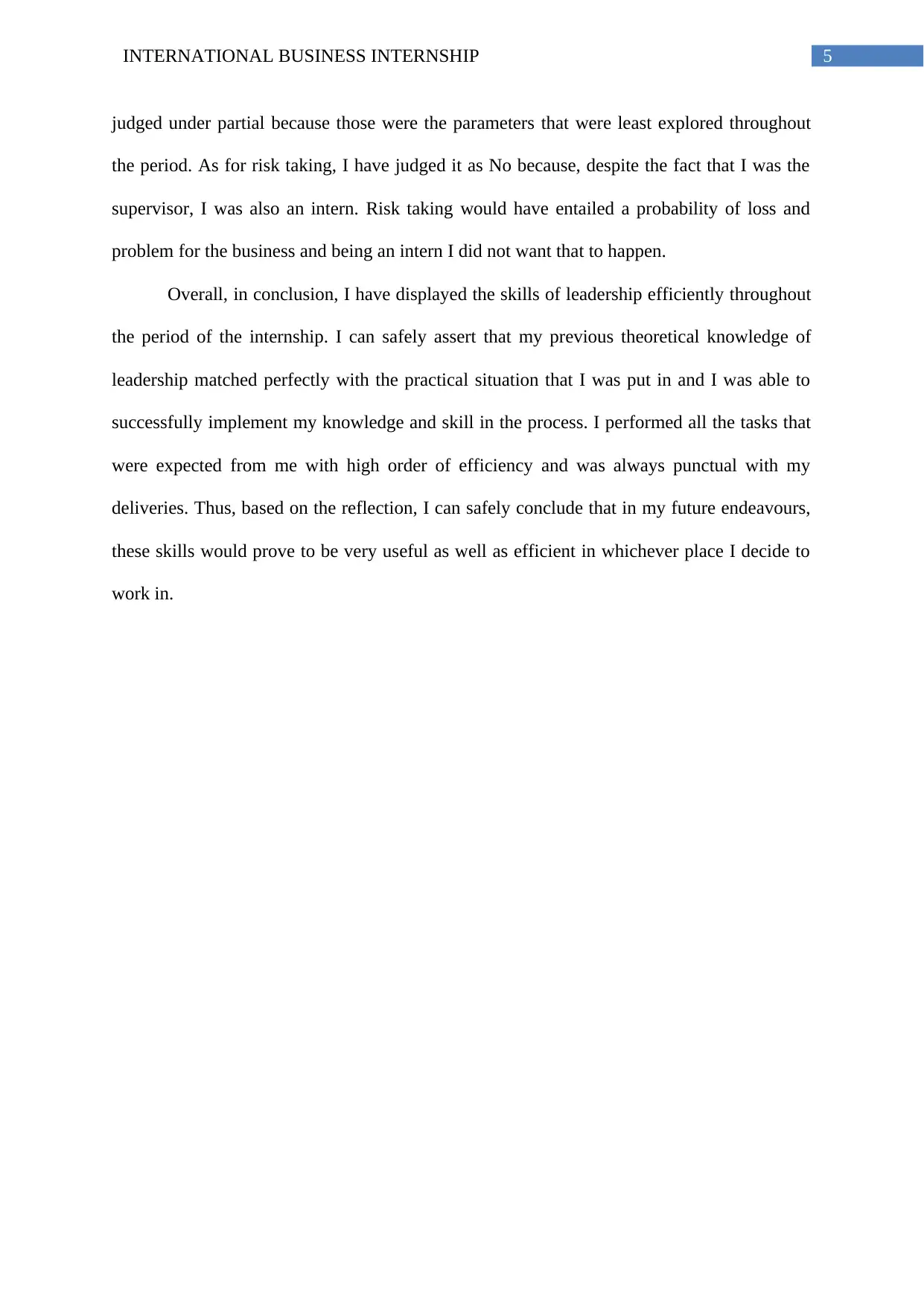
5INTERNATIONAL BUSINESS INTERNSHIP
judged under partial because those were the parameters that were least explored throughout
the period. As for risk taking, I have judged it as No because, despite the fact that I was the
supervisor, I was also an intern. Risk taking would have entailed a probability of loss and
problem for the business and being an intern I did not want that to happen.
Overall, in conclusion, I have displayed the skills of leadership efficiently throughout
the period of the internship. I can safely assert that my previous theoretical knowledge of
leadership matched perfectly with the practical situation that I was put in and I was able to
successfully implement my knowledge and skill in the process. I performed all the tasks that
were expected from me with high order of efficiency and was always punctual with my
deliveries. Thus, based on the reflection, I can safely conclude that in my future endeavours,
these skills would prove to be very useful as well as efficient in whichever place I decide to
work in.
judged under partial because those were the parameters that were least explored throughout
the period. As for risk taking, I have judged it as No because, despite the fact that I was the
supervisor, I was also an intern. Risk taking would have entailed a probability of loss and
problem for the business and being an intern I did not want that to happen.
Overall, in conclusion, I have displayed the skills of leadership efficiently throughout
the period of the internship. I can safely assert that my previous theoretical knowledge of
leadership matched perfectly with the practical situation that I was put in and I was able to
successfully implement my knowledge and skill in the process. I performed all the tasks that
were expected from me with high order of efficiency and was always punctual with my
deliveries. Thus, based on the reflection, I can safely conclude that in my future endeavours,
these skills would prove to be very useful as well as efficient in whichever place I decide to
work in.
⊘ This is a preview!⊘
Do you want full access?
Subscribe today to unlock all pages.

Trusted by 1+ million students worldwide
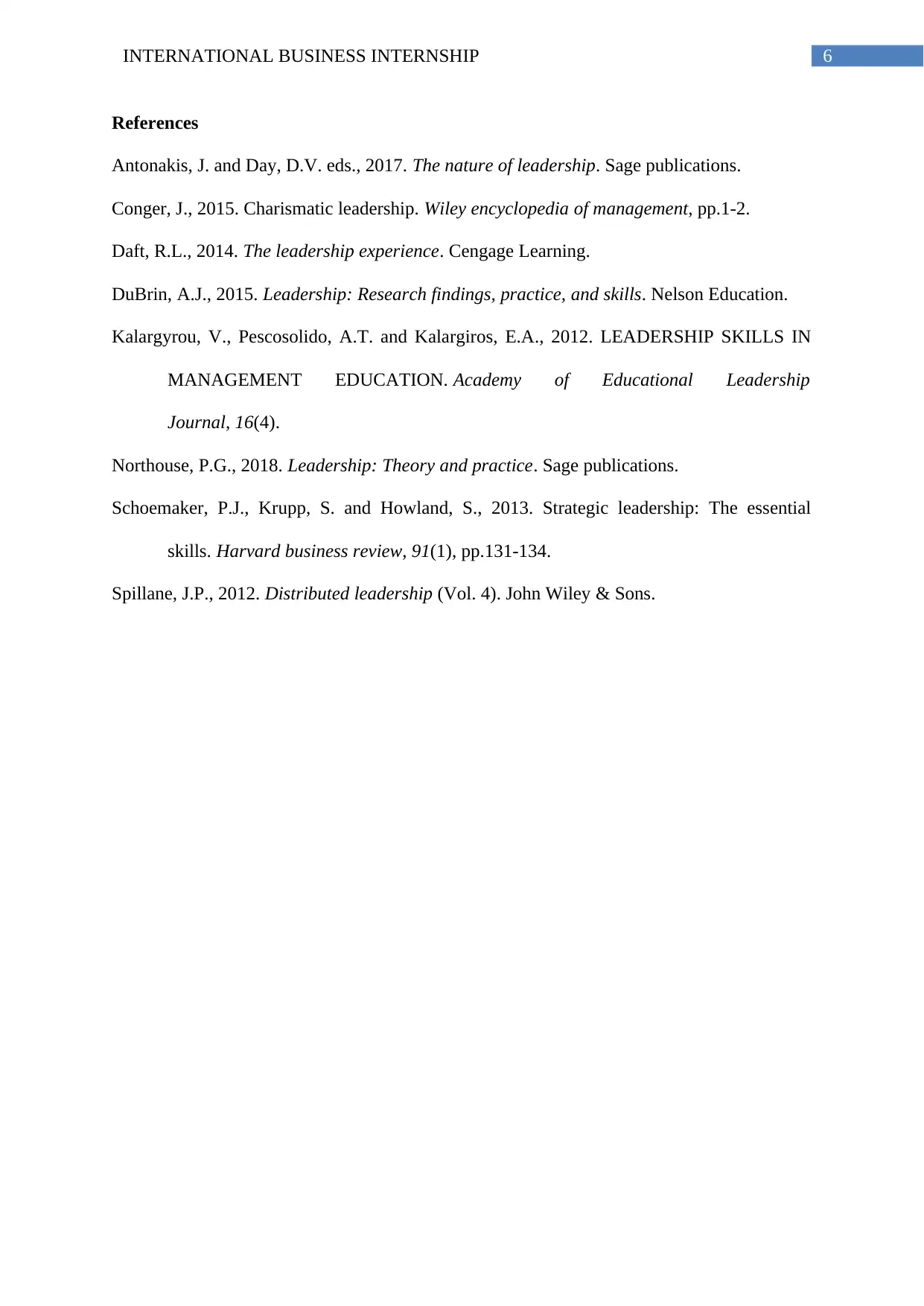
6INTERNATIONAL BUSINESS INTERNSHIP
References
Antonakis, J. and Day, D.V. eds., 2017. The nature of leadership. Sage publications.
Conger, J., 2015. Charismatic leadership. Wiley encyclopedia of management, pp.1-2.
Daft, R.L., 2014. The leadership experience. Cengage Learning.
DuBrin, A.J., 2015. Leadership: Research findings, practice, and skills. Nelson Education.
Kalargyrou, V., Pescosolido, A.T. and Kalargiros, E.A., 2012. LEADERSHIP SKILLS IN
MANAGEMENT EDUCATION. Academy of Educational Leadership
Journal, 16(4).
Northouse, P.G., 2018. Leadership: Theory and practice. Sage publications.
Schoemaker, P.J., Krupp, S. and Howland, S., 2013. Strategic leadership: The essential
skills. Harvard business review, 91(1), pp.131-134.
Spillane, J.P., 2012. Distributed leadership (Vol. 4). John Wiley & Sons.
References
Antonakis, J. and Day, D.V. eds., 2017. The nature of leadership. Sage publications.
Conger, J., 2015. Charismatic leadership. Wiley encyclopedia of management, pp.1-2.
Daft, R.L., 2014. The leadership experience. Cengage Learning.
DuBrin, A.J., 2015. Leadership: Research findings, practice, and skills. Nelson Education.
Kalargyrou, V., Pescosolido, A.T. and Kalargiros, E.A., 2012. LEADERSHIP SKILLS IN
MANAGEMENT EDUCATION. Academy of Educational Leadership
Journal, 16(4).
Northouse, P.G., 2018. Leadership: Theory and practice. Sage publications.
Schoemaker, P.J., Krupp, S. and Howland, S., 2013. Strategic leadership: The essential
skills. Harvard business review, 91(1), pp.131-134.
Spillane, J.P., 2012. Distributed leadership (Vol. 4). John Wiley & Sons.
1 out of 7
Related Documents
Your All-in-One AI-Powered Toolkit for Academic Success.
+13062052269
info@desklib.com
Available 24*7 on WhatsApp / Email
![[object Object]](/_next/static/media/star-bottom.7253800d.svg)
Unlock your academic potential
Copyright © 2020–2026 A2Z Services. All Rights Reserved. Developed and managed by ZUCOL.





